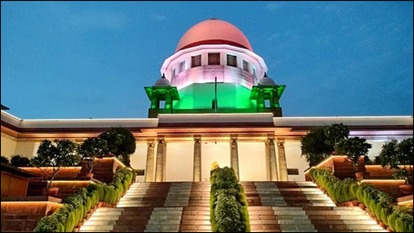
Supreme Court Rejects Quota for Civil Judges in District Judge Promotions, Issues Fresh Rules on Seniority
Top Court Says Merit, Not Reservation, Will Decide Entry to Higher Judicial Service
Clear Guidelines Issued to Ensure Fairness in Promotions across States
By Our Legal Reporter
New Delhi: November 20, 2025:
In an important judgment affecting the judicial service structure across India, the Supreme Court has ruled that civil judges cannot claim reservation or quota for promotion to the post of District Judge. The Court clarified that entry into the Higher Judicial Service must be based strictly on merit, seniority and performance, and not on caste-based or category-based reservation.
Also Read: Punjab & Haryana High Court Limits Legal Heirs’ Tax Liability, Quashes Attachment of Property
Along with rejecting the claim for a promotional quota, the Supreme Court also laid down a detailed set of guidelines on seniority, merit ranking, and promotional procedure, which will now be followed by all states and High Courts. The ruling is expected to bring greater uniformity and transparency to the process of judicial promotions.
This judgment will have a major impact on hundreds of judicial officers working across the country, especially those who aspire to rise to the position of District Judge, which plays a vital role in the functioning of the judiciary.
### Why the Case Reached the Supreme Court
Also Read: Odisha High Court Orders Bank to Refund Money Taken From Husband’s Pension for Wife’s Loan Default
Civil judges from various states had approached the Supreme Court claiming that they were entitled to reservation in the process of promotion to District Judge posts. They argued that reservation is constitutionally guaranteed in government services and should apply to the judiciary as well.
However, High Courts disagreed, stating that rules framed under Article 233 of the Constitution—which deals with appointment of District Judges—do not allow for reservation in such promotions. Because appointments to Higher Judicial Service must be made from either:
- Advocates with at least 7 years of practice (Direct Recruitment), or
- Civil Judges (Promotional Channel),
The states sought clarity from the Supreme Court to resolve the long-standing conflict.
### Supreme Court’s Key Findings
The Supreme Court made several crucial observations while rejecting the claim for quota:
- Article 233 does not permit reservation when promoting civil judges to the post of District Judge.
- The process is meant to ensure judicial independence, where appointments are based on competence, not social category.
- Judicial promotions cannot follow the same model as general government service promotions.
- The Higher Judicial Service must remain a merit-based system, ensuring efficiency and credibility in justice delivery.
Also Read: Major Change in Land Registry Rules: Two New Documents Now Mandatory for Property Registration
The Court also said that introducing reservation at this stage of judicial hierarchy could affect the quality of judges who handle serious civil and criminal matters.
### New Guidelines on Seniority and Promotion
Recognizing inconsistencies in how states and High Courts manage promotions, the Supreme Court issued comprehensive guidelines to ensure uniformity nationwide.
Some major points include:
1. Seniority Must Be Calculated Uniformly
All states must follow a single, transparent formula for determining seniority among civil judges. Seniority will now depend on the date of regular appointment, not on ad-hoc appointments or training periods.
2. Merit-Cum-Seniority to Be the Main Rule
- Annual Confidential Reports (ACRs)
- Performance
- Integrity
- Experience
- Standing in the service
Seniority will be considered only after merit.
3. Written Tests and Interviews for Merit-Based Promotions
- Written tests
- Interviews
- Objective evaluation criteria
Also Read: Supreme Court Clears Way for CAs to Join ITAT without 25-Year Experience Rule
These tests must be transparent and free from ambiguity.
4. Clear Timelines for Promotion
High Courts must complete the promotional process every year, ensuring no officer loses out due to administrative delay.
5. No Backdoor Quota
Under no circumstance can reservation or special quotas be introduced for District Judge promotions.
Also Read: Supreme Court Rules That Assigning a Specific Performance Decree Does Not Need Registration
### Impact on Civil Judges across India
The Supreme Court’s ruling will significantly affect the career path of civil judges:
1. Promotions Now Based Solely on Merit
Civil judges must focus on performance, judgments, courtroom management, and ACRs.
2. No Reservation Benefit
Judicial officers who relied on caste-based reservation in lower services will not get the same benefit in promotions.
3. Increased Transparency
With uniform seniority rules and annual promotion cycles, officers will have a clearer understanding of where they stand.
4. More Competition
The number of eligible candidates for District Judge posts will increase, making merit-based evaluation more competitive.
Impact on Judicial Administration
- Better Quality of District Judges
- Fewer Legal Challenges
- Faster Recruitment
- Greater Public Confidence
### Reactions to the Verdict
The legal community has generally welcomed the decision, noting that courts must prioritize capability and experience over reservation policies at higher levels.
Judicial officers, however, have shown mixed reactions—some appreciated the clarity on seniority, while others expressed disappointment over the rejection of quota.
Court administration experts say the judgment reinforces the independence of the judiciary, as the system must remain free from political or social pressures when appointing senior judges.
### Conclusion
The Supreme Court’s decision to disallow reservation for civil judges seeking promotion to the post of District Judge marks a pivotal moment in India’s judicial service system. By laying down detailed guidelines on seniority, merit evaluation, and promotional procedures, the Court has created a more transparent and uniform structure for the Higher Judicial Service.
This ruling not only clarifies long-standing confusion but also strengthens the quality, efficiency, and independence of the judiciary—ensuring that the country’s justice system remains robust and fair.